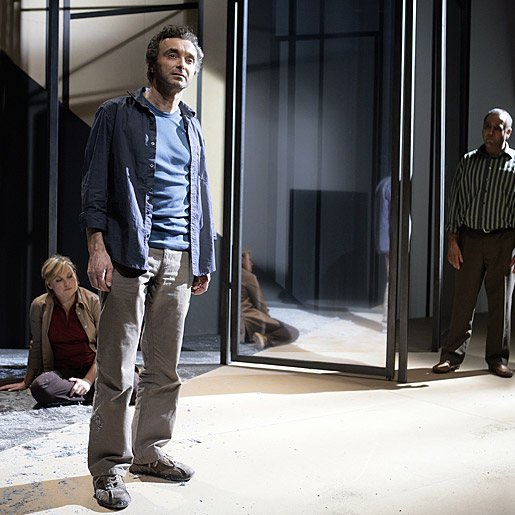
État de piège
Genre: play by Dominique Caillat.
Summary:
Christine, a German journalist working in Jerusalem has recently found two long lost friends: the Palestinian Abdoul and the Israeli Amos, whom she has not seen since childhood. Christine is to meet them in a café and plans to interview them about the Israeli-Palestinian conflict. However, she arrives late and stands amidst ruins: the place has been bombed out in a terror attack and both her friends are among the dead. Christine locks herself up in her hotel room and breaks down, overcome with feelings of guilt. Abdoul and Amos suddenly appear. Is it a hallucination? A vision? A psychosis? In any event, the meeting and the interview will take place after all …
Cast:
Two men, one woman, aged around 50.
Dauer: 90 min.
Music: sound-track.
Public: youth (16+) and adults.
Source:
In 2002 and 2004, Dominique Caillat had already spent several months in Israel and the occupied territories, gathering testimonies and information on both sides of the Green Line. The material was used in a play written in German, Kidnapping, which toured Germany in 2004-2005. In 2007, Caillat returned to the Middle-East and updated her research, which are the basis of her new play État de piège as well as a book, La Paix ou la mort (Peace or Death). État de piège uses the framework and characters of Kidnapping but has entirely new dialogues, attempting to rise above the level of day-to-day politics and violence to discover the universal human tragedy that is unfolding at our doorstep.
État de piège opened to public and press acclaim on November 20, 2007 at the Théâtre de Carouge in Geneva, in a production by François Rochaix, with Elzbieta Jasinska (Christine), Pierre Dubey (Amos) and Laurent Sandoz (Abdoul). Sets and lighting: Yves Bernard. Sound design: Graham Broomfield. Costumes: Laurence Imstepf et Letitia Rochaix-Ortis.
The play ran for four weeks and had 25 performances, all of them sold out (103,4% seat occupancy).
The production was sponsored by the “Société Académique de Genève” within the framework of the 2005-2008 Forum on Democracy and Terrorism and was accompanied by public debates. Guest speakers included: prof. Alexis Keller (Harvard University, Université de Genève), Gabriel de Montmollin (Publisher, Labor & Fides), Adam Maor (Israeli pacifist) and prof. Albert de Pury (theologian).
Proche-Orient : quel espoir ? (Middle-East: Is There Hope ?) >>
An Essay by Dominique Caillat, published in Le Temps on November 21, 2007
(in French)
Interview of Dominique Caillat by François Rochaix (director) >>
Reviews:
“An overwhelming play that perfectly combines emotion and information… a very dense material, interwoven with historical, political, biblical, philosophical and psychological considerations… Under François Rochaix’s direction, Elzbieta Jasinska, Laurent Sandoz und Pierre Dubey give a very lively performance that borders on naiveté. A choice that may be irritating at times but which has the advantage of alleviating the drama, and which reflects the emotional effervescence typical of anyone living under the permanent threat of “execution”.
(Le Temps, 11.24.07)
“Dominique Caillat has a real literary talent… This illustration is carried out on stage with a rather commendable economy of means but an enormous wealth of arguments. Dominique Caillat knows her subject perfectly. Her observer status allows her to consider this political imbroglio with sensitivity and intelligence.”
(Jean-Marie Félix, Espace 2)
“An ambitious play by Dominique Caillat… succeeds in her aim to transmit a message that catches us through our emotions… One is moved by the sincerity of the two protagonists, who are stuck in their one-way logic… One is also overwhelmed by the terrible human waste involved in this conflict… The play races forward, says a lot… and is, most of all, charged with such humanity that we begin to apprehend this tragedy, which is so simple and so complicated at the same time.”
(Marie-Pierre Genecand, Espace 2)
“I want to express my deepest admiration… A sensitive, intelligent approach that allows two men, who are trapped in the inextricable Israeli-Palestinian conflict, to express themselves. They dream of normality but are forever caught up by disaster. The play says it all… With enormous understanding for the people and the situation, the play offers a powerful and deeply moving summary of a conflict that gives rise to such contradictory emotions. Indeed, through the character of the journalist, who listens and divides her attention equally between her partners, both protagonists are treated with respect and are able to present their case. This wonderful play is served by an equally wonderful production…”
Tatiana Honegger, spectator.
(For the complete text of Mrs. Honegger’s letter in French click here >>).
“The play, which I saw in December 2007, expresses our deepest thoughts and says out loud what we only dare whisper. Those of us who have lived through the war shudder as we relive the past: the waiting, the fear, the obsessions, the leitmotivs…The beginning of the play has the insipid taste of theatre but the rest is a work of art. [État de piège] is so helpful in that it throws light on these tragic events, it enlightens – one sees and one feels better. This play is like a psychotherapy. […] I hope it will go on being performed. It needs to be shown in the U.S., particularly in New York, as well as in Europe and in the Arab countries. In Arab and English translation. I take my hat off to Mrs. Caillat. And to the three actors. Bravo.”
Walid Abi Kheir, spectator (Genève)






